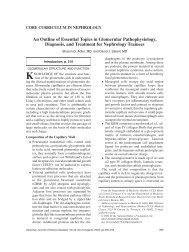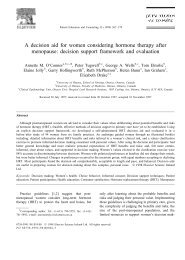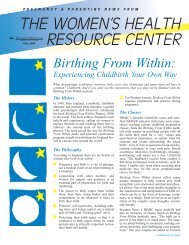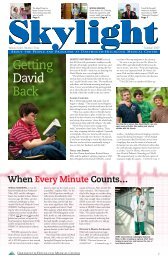Surgery and Healing in the Developing World - Dartmouth-Hitchcock
Surgery and Healing in the Developing World - Dartmouth-Hitchcock
Surgery and Healing in the Developing World - Dartmouth-Hitchcock
You also want an ePaper? Increase the reach of your titles
YUMPU automatically turns print PDFs into web optimized ePapers that Google loves.
42<br />
436 <strong>Surgery</strong> <strong>and</strong> <strong>Heal<strong>in</strong>g</strong> <strong>in</strong> <strong>the</strong> Develop<strong>in</strong>g <strong>World</strong><br />
There are skilled practitioners <strong>in</strong> parts of <strong>the</strong> Third <strong>World</strong> who cont<strong>in</strong>ue to operate,<br />
often heroically, aga<strong>in</strong>st <strong>the</strong> daunt<strong>in</strong>g dem<strong>and</strong> <strong>and</strong> with meager resources.<br />
Not all of <strong>the</strong>m have been to medical school, or even to any k<strong>in</strong>d of professional<br />
school. Surgeons with formal tra<strong>in</strong><strong>in</strong>g <strong>in</strong> all aspects of surgical care are rare <strong>in</strong> Third<br />
<strong>World</strong> environments, <strong>and</strong> where <strong>the</strong>y do exist is typically <strong>the</strong> urban centers. There<br />
are few surgeons, aside from dedicated missionaries, <strong>in</strong> places such as rural Africa.<br />
When I had visited <strong>and</strong> worked with Charles Woodrow, MD, FACS, <strong>in</strong> Maurrere,<br />
Nor<strong>the</strong>rn Mozambique, my presence doubled <strong>the</strong> number of Fellows of <strong>the</strong> American<br />
College of Surgeons <strong>in</strong> Mozambique, a nation of 28 million people that counts<br />
a total of four Mozambican surgeons. There is one Malawian surgeon, <strong>in</strong> a nation of<br />
18 million souls.<br />
In Tanzania, for example, <strong>the</strong>re were less than 100 specialist physicians, <strong>and</strong> all<br />
of <strong>the</strong>m, with a few exceptions, were <strong>in</strong> <strong>the</strong> capital of Dar es Salaam. Apart from<br />
missionary physicians, <strong>the</strong>re were no Tanzanian surgeons outside <strong>the</strong> capital.<br />
Urban Africa may be grow<strong>in</strong>g rapidly, for better or worse, but most of <strong>the</strong><br />
third-<strong>World</strong> population is resident <strong>in</strong> <strong>the</strong> rural areas where <strong>the</strong>y eke out subsistence<br />
<strong>in</strong> hunt<strong>in</strong>g, ga<strong>the</strong>r<strong>in</strong>g, or stoop-labor agriculture. 13 As <strong>the</strong> st<strong>and</strong>ard of liv<strong>in</strong>g rises <strong>in</strong><br />
a small segment of <strong>the</strong> urban population, disease patterns, health care, <strong>and</strong> social<br />
behavior change as <strong>the</strong> gap between urban <strong>and</strong> rural widens. Even as some improvement<br />
has been noted <strong>in</strong> third-<strong>World</strong> productivity (as measured by an <strong>in</strong>crease <strong>in</strong><br />
gross domestic product), this marg<strong>in</strong>al <strong>in</strong>crement has been overwhelmed by <strong>the</strong><br />
much greater <strong>in</strong>crease <strong>in</strong> population growth, <strong>and</strong> <strong>the</strong> st<strong>and</strong>ard of liv<strong>in</strong>g has cont<strong>in</strong>ued<br />
to fall. The distance today between First -<strong>and</strong> third-<strong>World</strong> st<strong>and</strong>ards of liv<strong>in</strong>g<br />
<strong>and</strong> that of our own colonial times, <strong>and</strong> it is apparent <strong>in</strong> each of my succeed<strong>in</strong>g<br />
visits, over now more than three decades, to <strong>the</strong> Third <strong>World</strong> that this gap widens. 14<br />
The First <strong>World</strong> has been produc<strong>in</strong>g superb surgeons with highly developed<br />
skills that have generally been exclusively dedicated to <strong>the</strong> care of only 6 percent of<br />
<strong>the</strong> world’s population. Fully 90 percent of <strong>the</strong> world’s surgical needs are outside of<br />
<strong>the</strong> U.S. <strong>and</strong> Europe.<br />
Many of <strong>the</strong> American surgeons <strong>in</strong> practice today have noted a shift <strong>in</strong> <strong>the</strong>ir<br />
practice pattern <strong>and</strong> satisfaction <strong>in</strong> surgical service—<strong>the</strong>y seem busier than ever with<br />
required paperwork, but less patient care, with some surgeons operat<strong>in</strong>g less than<br />
one full day per week. Redundancy <strong>in</strong> surgical services may be expensive, <strong>and</strong> a<br />
large, fixed, <strong>and</strong> idle capacity may be a waste of a precious resource <strong>in</strong> worldwide<br />
scarcity of supply.<br />
There exists a great, even overwhelm<strong>in</strong>g, need for our surgical services. Their<br />
statement is less true than ever before with respect to <strong>the</strong> practices <strong>in</strong> our home<br />
environment, <strong>and</strong> more true than ever before with respect to an exp<strong>and</strong><strong>in</strong>g <strong>and</strong><br />
needy world. Students sitt<strong>in</strong>g <strong>in</strong> medical school classrooms today are not likely to<br />
f<strong>in</strong>d <strong>the</strong>ir immediate neighborhood plead<strong>in</strong>g for <strong>the</strong>ir specialty services. If <strong>the</strong>y have<br />
an <strong>in</strong>terest <strong>in</strong> surgery, it will not be because of an overwhelm<strong>in</strong>g need <strong>and</strong> dem<strong>and</strong><br />
for those services <strong>in</strong> almost any urban or even rural part of North America or Europe,<br />
or <strong>the</strong> major capitals of South America or Asia. Surgical services are needed<br />
where people live, <strong>and</strong> <strong>in</strong>creas<strong>in</strong>gly <strong>the</strong>se are <strong>the</strong> regions of <strong>the</strong> world <strong>in</strong> which surgeons<br />
are absent.<br />
We have enjoyed <strong>the</strong> rapid advance <strong>and</strong> maturation of surgical technology <strong>in</strong><br />
much of <strong>the</strong> First <strong>World</strong>; but can this truly be called <strong>the</strong> golden age of surgery, when<br />
whole nations have no qualified surgical services? <strong>World</strong>-class surgeons who have<br />
dedicated omnibus per artem <strong>and</strong> f<strong>in</strong>d <strong>the</strong>mselves redundant, or <strong>the</strong> superfluous










